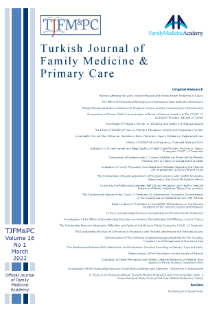ERGEN GEBELİKLERİNE TOPLUMUN BAKIŞI VE SAĞLIK PROFESYONELLERİNDEN BEKLENTİLERİ
Ergen, Gebelik, Birinci basamak sağlık hizmeti
PUBLIC OPINION TOWARDS ADOLESCENT PREGNANCIES AND EXPECTATIONS FROM HEALTHCARE PROFESSIONALS
Adolescent, Pregnancy, Primary Health Care,
___
- 1. McIntyre P. Pregnant adolescents delivering on global promises of hope., WHO Library Cataloguing-in-Publication, Geneva, 2006;4-7.
- 2. Hatipoglu N. Pubertal period and its problems. Turkish Journal of Family Practice. 2012;16:1-13.
- 3. Sungurtekin Ozkan M. The Assumed Role of the Jurisdiction in the Preventation of the Juvenile Marriages. Journal of Yasar University. 2013;8:2177-2189.
- 4. Turkish civil code. Law N. 4721, dated 7/12/2002. Article 11.
- 5. Dogan A, Cebioglu S. Emerging Adulthood: A Period between Adolescence and Adulthood. Turkish Psychological Articles. 2011;14(28):11-21.
- 6. Atak H, Cok F. A new period in human life: Emerging adulthood. Journal of Childhood and Adolescence Mental Health. 2010;17(1):39-50.
- 7. Hacettepe University Institute of Population Studies (2014) "2013 Demographic and Health Surveys” Hacettepe University Institute of Population Studies. Turkish Ministry of Development and TUBITAK. Ankara. Turkey. 2014;60 table:4.1
- 8. Hacettepe University Institute of Population Studies (2019) "2018 Demographic and Health Surveys” Hacettepe University Institute of Population Studies. TC Presidential strategy and budget department and TUBITAK. Ankara. Turkey. 2018;68 table:5.12
- 9. Kaya V, Yalcinkaya O. Can population be a source of economic growth?: A historical look at “at least three-child policy” Ataturk University Journal of Economics and Administrative Sciences. 2014;28(1):165-198.
- 10. Gurses I, Kilavuz MA. The Importance of Intergenerational Religious Education and Communication in Terms of Psychological Developmental Stages Theory of Erikson. Uludag University The Review of The Faculty of Theology.2011;20(2):153-166.
- 11. Melekoglu R, Evruke C, Kafadar T, et al. Perinatal Outcomes Of Adolescent Pregnancy. JTurk Soc Obstet Gynecol. 2013;10(4):213-9.
- 12. Bespinar FU. Research on family structure in Türkiye, findings, and recommendations. Eds. Turgut M, Feyzioglu S. Ministry of family, labor and social services, general directorate of family and community services. Research and Social Policy Series 07. Çizge Tanıtım ve Kırtasiye Ltd. Şti, İstanbul, 2014;168.
- 13. Koyun A, Taşkın L, Terzioğlu F. Women Health and Psychological Functioning in Different Periods of Life: Evaluation of Nursing Approach. Current Approaches in Psychiatry. 2011;3(1):67-99.
- 14. Mason E. WHO guidelines on preventing early pregnancy and poor reproductive health outcomes among adolescents in developing countries. 2011;1-9. https://apps.who.int/iris/bitstream/handle/10665/44691/9789241502214_eng.pdf;jsessionid=F72BCC203CD64A42297A9B3591A5D2A2?sequence=1. access date: 05 October 2020.
- 15. Keskinoglu P, Bilgic N, Picakciefe M, et al. Perinatal outcomes and risk factors of Turkish adolesccent mothers. J Pediatr Adolesc Gynecol. 2007; 20(1):19-24.
- 16. Bespinar FU. Research on family structure in Türkiye, findings, and recommendations. Eds. Turgut M, Feyzioglu S. Ministry of family, labor and social services, general directorate of family and community services. Research and Social Policy Series 07. İstanbul, Çizge Tanıtım ve Kırtasiye Ltd. Şti. 2014, p:143.
- 17. Turkish Statistical Institute, Central Dissemination System. TURKSTAT Population and demographic information. 2020; https://biruni.tuik.gov.tr/medas/?locale=en, access date: 05 October 2020.
- 18. Omar K, Hasim S, Muhammad N.A, Jaffar A, Hashim S.M, Siraj H.H. Adolescent pregnancy outcomes and risk factors in Malaysia. International Journal of Gynecology & Obstetrics. 2010; 111(3): 220-223.
- 19. Pirdal H, Yalçın B.M, Ünal M. Knowledge levels of pregnants on their pregnancy and the related factors. Turkish Journal of Family Pratices.2016; 20 (1): 7-15.
- ISSN: 1307-2048
- Yayın Aralığı: Yılda 4 Sayı
- Başlangıç: 2007
- Yayıncı: -
Ayşe Nur AKAR, Kenan TOPAL, Hüseyin AKSOY, Çiğdem GEREKLİOĞLU
Sağlık Çalışanlarının “COVID-19’a İlişkin Algılarının İncelenmesi: Bir Metafor Analizi
Erken ve Geç Başlangıçlı Alzheimer Hastalığının Bakım Veren Yükü Üzerine Etkisi
Merve Aliye AKYOL, Burcu AKPINAR SÖYLEMEZ, Özlem KÜÇÜKGÜÇLÜ
Tuğba TURGUT, Mehmet Akif GENÇ, Fatma Utkan DURAN UĞUR, Remzi BAHŞİ
ERGEN GEBELİKLERİNE TOPLUMUN BAKIŞI VE SAĞLIK PROFESYONELLERİNDEN BEKLENTİLERİ
Funda SALGÜR, Altuğ KUT, Özgür ÇAYCI, Yasemin ÇETİNEL, Fisun SÖZEN
Fatma Özlem ÖZTÜRK, Günseli PEKER
Rabia HACIHASANOĞLU AŞILAR, Sibel ARIKAN HACIHASANOĞLU, Arzu YILDIRIM, Hilal ŞAHİN
Gebelerin Prekonsepsiyonel Bakım ve Danışmanlık Alma Durumları ve İlişkili Faktörler
Elif ÇEVİK ERGİ, Mustafa Kürşat ŞAHİN
Depremlerin Görünmez Yıkımı: İnsanların Psikolojik Sağlığı Üzerindeki Etkileri
BİRLİKTE DAHA GÜÇLÜ: COVID-19 SALGINI SIRASINDA AİLE İÇERİSİNDEKİ KORUYUCU FAKTÖRLERİN İNCELENMESİ
